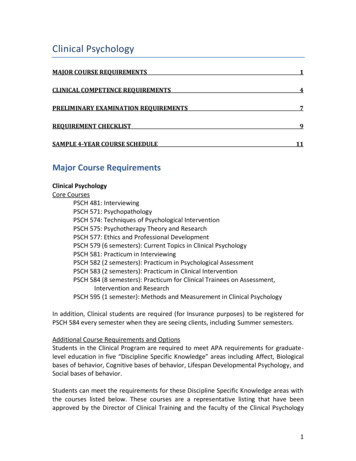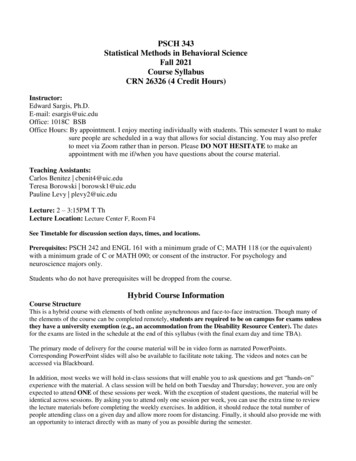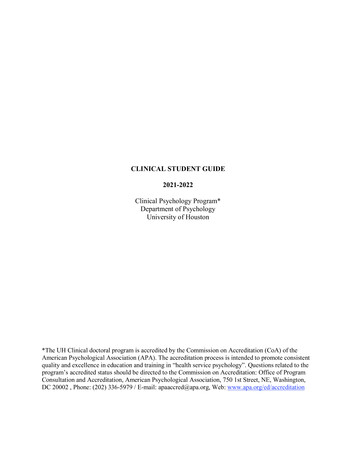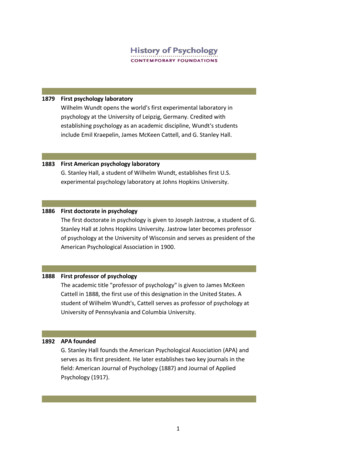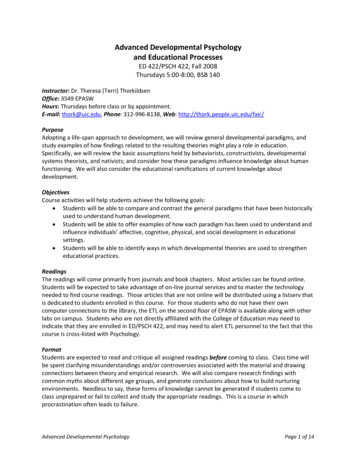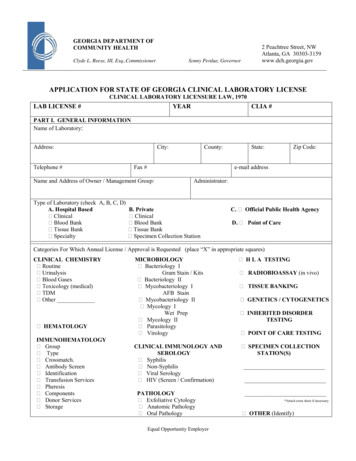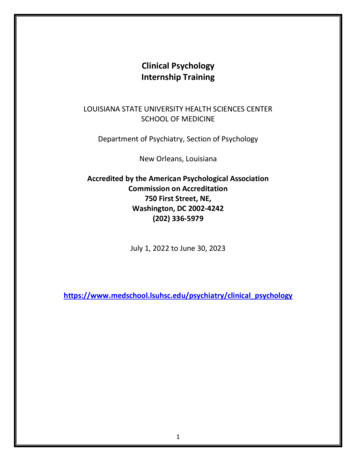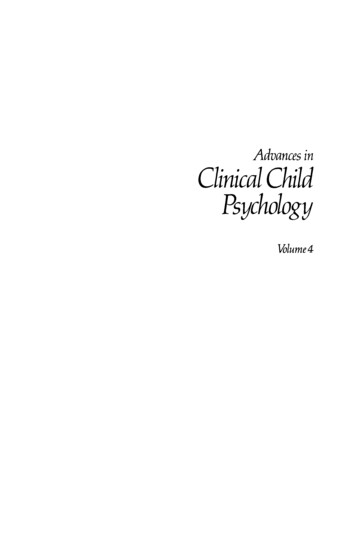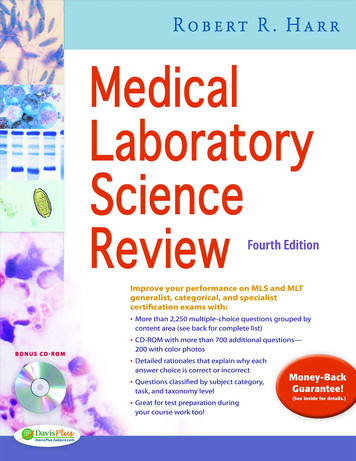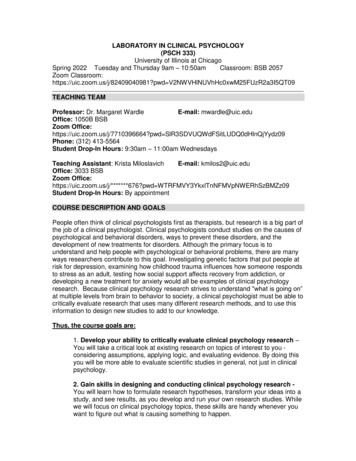
Transcription
LABORATORY IN CLINICAL PSYCHOLOGY(PSCH 333)University of Illinois at ChicagoSpring 2022 Tuesday and Thursday 9am – 10:50amClassroom: BSB 2057Zoom Classroom:https://uic.zoom.us/j/82409040981?pwd V2NWVHlNUVhHc0xwM25FUzR2a3I5QT09TEACHING TEAMProfessor: Dr. Margaret WardleE-mail: mwardle@uic.eduOffice: 1050B BSBZoom Office:https://uic.zoom.us/j/7710396664?pwd SlR3SDVUQWdFSitLUDQ0dHlnQjYydz09Phone: (312) 413-5564Student Drop-In Hours: 9:30am – 11:00am WednesdaysTeaching Assistant: Krista MiloslavichE-mail: kmilos2@uic.eduOffice: 3033 BSBZoom Office:https://uic.zoom.us/j/*******676?pwd WTRFMVY3YkxlTnNFMVpNWERhSzBMZz09Student Drop-In Hours: By appointmentCOURSE DESCRIPTION AND GOALSPeople often think of clinical psychologists first as therapists, but research is a big part ofthe job of a clinical psychologist. Clinical psychologists conduct studies on the causes ofpsychological and behavioral disorders, ways to prevent these disorders, and thedevelopment of new treatments for disorders. Although the primary focus is tounderstand and help people with psychological or behavioral problems, there are manyways researchers contribute to this goal. Investigating genetic factors that put people atrisk for depression, examining how childhood trauma influences how someone respondsto stress as an adult, testing how social support affects recovery from addiction, ordeveloping a new treatment for anxiety would all be examples of clinical psychologyresearch. Because clinical psychology research strives to understand "what is going on”at multiple levels from brain to behavior to society, a clinical psychologist must be able tocritically evaluate research that uses many different research methods, and to use thisinformation to design new studies to add to our knowledge.Thus, the course goals are:1. Develop your ability to critically evaluate clinical psychology research –You will take a critical look at existing research on topics of interest to you considering assumptions, applying logic, and evaluating evidence. By doing thisyou will be more able to evaluate scientific studies in general, not just in clinicalpsychology.2. Gain skills in designing and conducting clinical psychology research You will learn how to formulate research hypotheses, transform your ideas into astudy, and see results, as you develop and run your own research studies. Whilewe will focus on clinical psychology topics, these skills are handy whenever youwant to figure out what is causing something to happen.
3. Learn how to present your findings to others - Research is only useful if itis communicated. Thus, you will also learn how to present your researcheffectively. We will teach you two ways scientists commonly use: A poster and apaper. Clear communication is key in any field, so the feedback you get on theseassignments can help you in many possible careers.PREQUISITESThis is an advanced class where you will apply knowledge you have gained in previouscourses. Students must already have credit for PSCH 100 (Introduction to Psychology),PSCH 242 (Introduction to Research in Psychology), and PSCH 343 (Statistical Methodsin Psychological Science). In addition, you should have credit for or be concurrentlyenrolled in PSCH 270 (Abnormal Psychology) or PSCH 210 (Theories of Personality). Ifyou have not taken these prerequisites, you can’t take this class.COURSE MATERIALSThere are a few reading assignments, which will be available in the Blackboard site forthis course. However, reading assignments are minimal because you are expected toselect your own reading based on your research projects in the class. So YOU will beidentifying what you need to read in order to complete your own research projects.We will be using APA style, 7th edition for assignments. I will make copies of the manualavailable in class, and you can also use these online resources: https://apastyle.apa.org/style-grammar-guidelines SE REQUIREMENTSClass Participation – 20% of grade: This course requires in-person attendance atinteractive lectures and work periods that take place during the scheduled class time. Itis critically important that you regularly attend and participate in class, for severalreasons: 1. Classes are “hands on” - you will actually be conducting research duringclass. 2. The course moves rapidly, and classes build on one another to provide theskills you need to do research, so missing class makes it hard to catch up. 3. The TAand I provide a lot of individual assistance during class, so even if research is not yourbest area, by attending regularly you can get one-on-one help and do well. Because inmy experience active participation is so important to your success, I have made it part ofyour grade. However, I also recognize students have legitimate reasons they need tomiss class. I have come up with the following policy to try to provide flexibility whilemaking sure you don't fall behind:1. You can drop one participation point. You can miss one class during thesemester, no questions asked, and still get a 100% in participation. If you don’tmiss any classes, you get a bonus point!2. There are multiple ways to get each participation point.Default Option: Attend and participate in class. To get your point this way, youjust need to attend and participate in class. Participating means:- On-time to a reasonable degree (not more than 10 min. late, and notconsistently late)
- Completing what you are supposed to bring/do in class as listed on thesyllabus, uploading to class Google Drive for review if needed- Engaging constructively (e.g. on topic, not making personal comments,giving concrete suggestions for improvement when asked)Make-Up Options: Life happens, and sometimes people have a good reason tomiss class, so I also have a Zoom Room open and recording each class. Allrecorded classes are posted to Blackboard. That allows some options that can tohelp you out in case of emergency or illness. These are not intended to be theregular way you attend class, and vacations are not emergencies. I alwaysreserve the right to ask for documentation of your emergency or illness and willlikely ask if you use this option more than once.A. Attend via Zoom. If you can't attend in-person but are able toparticipate at the regular time online, you can log into the Zoom room. Toget your point this way you need to notify me by e-mail at least 10minbefore class starts that you will be attending online and why – that way Iknow to let you into the room.B. Watch the recorded class and check in with me. To get your point thisway, you need to do two things. 1. Watch the recorded class by 5pmFriday of the week it was presented. 2. Either come to my drop-in hoursthat week or schedule a separate time to check in with me, also by 5pmFriday of that week. Sending me an e-mail does not count, I need tocheck in with you interactively, in-person, by video conferencing or byphone, so I can make sure you understood the material.Research Assignments – 65% of grade: Consistent with the focus of this course onapplying knowledge to real activities, there are no exams. Instead, most of your gradecomes from assignments you will do while carrying out two major research projects.These will be: 1. A field study of online behavior; 2. A laboratory study. The field studywill be done in collaboration with 3-4 people who are interested in similar topics. You willcome up with the idea and conduct your field observations with your group, but producean individual product that will be graded individually. The laboratory study will be anindividual project. The breakdown for research assignments is:Basic Training (10%): To do research you need to understand the ethical issuesinvolved, so you will complete two online training courses in ethics.The breakdown for basic training is:Online CITI Ethics training (5%) – This is the real training required of allresearchers at UIC. It will teach you about the major ethical issues andprinciples involved in doing research with real people as your subjects.Online plagiarism course (5%) – Science builds on the work of others,and it is ethically important to credit others for their ideas. This course willhelp you identify what plagiarizing is, and how to avoid it.Field Study (20%): There are some things we can learn about people just bycarefully observing their natural behavior “in the field”. In the past we wouldwatch people in public settings like on campus, or in the park. But now a lot ofour lives are carried out in public online (e.g. on Twitter, on TikTok). There isalso more content relevant to clinical psychology, like discussions of depressionor eating disorders, in online forums than in public on campus. Thus, yourinterest group will select a topic that you can observe in public online venues.You will first produce an annotated bibliography evaluating the research that has
already been done on your topic, to help you pick a hypothesis and refine yourstudy. Each group member will then complete a certain number of observations.Group members will pool their observations to make a group data set, andconduct statistical analyses together to test their hypothesis, but each individualwill complete their own poster based on the results. Therefore, although yourgroup may share references to prior studies and results, you should not sharethe text of your annotated bibliography, or the introduction, hypotheses, methods,or discussion sections of your poster.The breakdown for the field study is:First Annotated Bibliography (5%) – This will allow you to organize andevaluate the research that already exists on your topic. A minimum of 5scholarly sources (original research articles, meta-analyses or literaturereviews) should be summarized.Individual Poster (15%) – The scientific poster is one major way scientistsshare their research, and a nice way to learn how to describe the majorparts of a study (Introduction, Hypotheses, Methods, Results, Discussion)before you try writing a full paper.Laboratory Study (35%): This will be a laboratory study using a task that youwill program and administer to your classmates using OpenSesame (apsychological study presentation software). We will talk more about what clinicalpsychology laboratory studies can look like as the class progresses. You will firstpick a topic that you can learn about using a laboratory study. You will then doan annotated bibliography to evaluate the research that has already been doneon your topic, and to refine your study idea. You will write a program that will runyour study with help from me and the TA, and your classmates will complete it.You will do statistical analyses on the data to test your hypotheses, and write afinal APA-style paper (10-12 pages) describing your findings. The breakdown forthe laboratory study is:Second Annotated Bibliography (10%) – This will allow you to organizeand evaluate the research that already exists on your topic. A minimum of10 scholarly sources (original research articles, meta-analyses orliterature reviews) should be summarized.Drafts - Introduction, methods, results, discussion (5%) – You will turn ina draft of each section of your paper for feedback. There are one or twopoints attached to each draft to encourage you to turn it in, but these arenot “graded”. Instead they are chances for the TA to help you fix thingsbefore the final paper. It is to your advantage to put your best effort intothese, so that you can get the feedback you need to ace the final paper.Final paper (20%) – This will be an APA-style paper (10-12 pages)describing your study and results. You will get examples and our entirescoring system as the semester progresses, and you will do drafts ofeach section (see above), so although this may seem a like a lot ofwriting, hopefully by the time you get to the end of the class, you aremostly pasting together things you’ve already written.Research Participation - 15% of grade: To meet the educational goals of this course,everyone in the course will be conducting research and collecting data. As a member ofthe class, you are required to participate in the research conducted by your classmatesand collect data that they will use, just as they are required to participate in yourresearch and collect data you will use. The breakdown for research participation is:
Contributing data to group field study (5%): See the field study description fordetails.Completing classmates’ laboratory studies (10%): See the laboratory studydescription for details.SUMMARY OF GRADINGClass Attendance and Participation – 20%Research Activities and Assignments – 65%Basic Training – 10%- Online CITI Ethics training (5%)- Online plagiarism course (5%)Field Study – 20%- First Annotated Bibliography (5%)- Individual poster (15%)Laboratory Study – 35%- Second Annotated Bibliography (10%)- Drafts - introduction, methods, results, discussion, graph (5%)- Final paper (20%)Research Participation - 15%Contributing data to group field study – 5%Completing classmates’ laboratory studies – 10%Overall grades will be on the following scale:A 90 – 100%B 80 – 89%C 70 – 79%D 60 – 69%F Below 60%COURSE POLICIESCOVID Safety: Based on UIC's current policies, after the first two weeks we areexpecting this class to be in-person without social distancing, but with everyonemasking. Particularly because we are working closely with each other in a smallclassroom, it is important for everyone who can be to be vaccinated, boosted andmasked. All students are required to get a COVID-19 vaccine before this semester andto disclose their vaccination status, OR if they are not able to get a vaccine, to completedaily health checks and weekly saliva testing. If you have not completed these steps,you cannot be in class. However, even if you are fully vaccinated, UIC is still requiringthat you do a saliva test upon returning to campus from the break, and wear masks inindoor spaces, including in our classroom. While you are in class you must have a maskcovering both your nose and mouth at all times. We will issue reminders to you the firstfew times if we notice your mask is not correct, but if you continue to not correctly mask,you will not be able to safely participate in class that day. You will be asked to leave,and will lose your participation point. If you are repeatedly not correctly masked toattend class, you may lose additional participation points or be unable to finish the class,and will be reported to the Dean of Students for disciplinary proceedings. If you have a
medical issue or disability that prevents you from wearing a mask, please contact Dr.Wardle with documentation to discuss accommodations ASAP.Turning in Work: You will be turning in two types of work in this class.1. In-Class Work: This is work you will be doing in class that we need to checkor comment on, such as the program you will use to collect data in your labstudy. These will not be graded, but turning them in is required to get yourparticipation point that day. In-class work will be turned in to a Google Drivefolder we will set up and share with you, and is due by the end of theaccompanying class. If you miss turning one in due to absence, you cancomplete it as part of making up your participation point for that class – talk to Dr.Wardle to make a plan for this if needed.2. Final Assignments: These are the end results of your research, such as yourposter and paper. These will be turned in to Blackboard, and are due by 5pm onthe date listed on the syllabus. Blackboard has a tendency to “go down” atinconvenient times. If there are problems with Blackboard, assignments will beaccepted via email to Dr. Wardle as a safety net (with the same 5:00pmdeadline). Late assignments will be accepted up to 7 days (one week) after thedeadline, but will be penalized 5% of total possible points for each day late (i.e.,“a half letter grade”). For example, if you earned 95 out of a total 100 points onan assignment originally due on 9/23 at 5:00pm, and turned it in at 5:05pm on9/23 (five minutes late), you would receive a grade of 90/100. If turned in before5:00pm 9/24, you would receive 85/100. If turned in anytime on 9/25, you wouldreceive 80/100. After 7 days, your grade would be 0 for the assignment.Exceptions can be made for emergencies, such as medical problems orcatastrophic tech difficulties. If something like this happens, contact Dr. WardleASAP to work out a plan.Non-class Use of Computers, Phones and Electronics: I require students to put theirphones away during class, and not use computers for anything but class work. The goalis to minimize distraction for you and people around you. When you have personalelectronics out, it is far too easy to check email, browse social media, or shop duringclass. All of that detracts from your ability to follow the material and get the most out ofthe education you’re paying for.Please note, I am on-call for a clinical trial of a new medication for cocaine addictionduring class hours, so I will be leaving my phone on only for calls from that study, andmay need to “step out” of class to respond in the event there is a patient emergency.Class Etiquette:Everyone is expected to behave maturely and professionally in class. That means:- be courteous and respectful to others;- express your own opinions in an appropriate manner;- refrain from discriminatory or hateful speech;- use your computer for course-related purposes only;- provide constructive feedback with concrete suggestions for improvement whenrequested to do so, avoiding personal comments;Accessibility: I am committed to this course being accessible to all students, regardlessof race, ethnicity, religion, gender identity, economic resources, or disabilities. Foradjustments that don’t touch on grading (e.g. having a notetaker, recording lectures,
advanced notice on particular topics), just let me know. You don’t need to have adocumented disability to request changes to make the course accessible to you. I amhappy to work with you to figure out what will help. If making the course accessible toyou requires adjustments that touch on grading (e.g. extended time on assignments), Iam still happy to make those changes. I will just ask that you register with the Office ofDisability Services (ODS) and bring a letter from the DRC documenting the necessaryaccommodations to me. You can contact ODS at (312) 413-2103 (voice) or (312) 4130123 (TTY).Plagiarism: To plagiarize is “to steal and pass off (the ideas or words of another) asone’s own” (Merriam-Webster Dictionary). Plagiarism includes not only direct copying ofsource documents, but paraphrasing others’ written or verbal comments withoutindicating the original source. It is especially important to avoid this in science, becausewe need to be able to check your sources to evaluate your evidence. Therefore, we willuse SafeAssign to automatically screen for plagiarism in all assignments submitted toBlackboard. The consequences of submitting plagiarized work can be a) receiving afailing grade on the assignment; b) receiving a failing grade in the course; or c) beingexpelled from the university.Academic Integrity: Students must abide by the academic integrity guidelinesestablished by the university, and described athttp://www.uic.edu/ucat/catalog/GR.shtml#qa. Failure to maintain behavior according tothese guidelines is evaluated in accord with the Student Disciplinary Policy.Religious Holidays: I tried to avoid having student projects be turned in or completedon religious holidays. However, there may be some conflicts with our scheduled classdays. If you have a religious observance on a deadline or class day, let me know at leasta class period in advance, and we will work out a plan. Religious holidays are protectedby University policy (https://oae.uic.edu/religious-calendar/), and you will not bepenalized for taking them.Incomplete Grades: There are fairly strict guidelines on when I can give an incompletegrade in the class, and for getting incomplete grades off your transcript. You can seethe full university policy here on incomplete grades here(https://registrar.uic.edu/student records/grading system.html). If you have a majoremergency that you think may keep you from completing the class, the most importantthing is to talk to me about it as soon as possible. I can’t issue an incomplete after finalgrades are submitted.HELPFUL RESOURCES AND TIPSDrop-In Hours:I will be hanging out in my Zoom Office, listed at the top of the syllabus, during drop-inhours, just waiting for you to show up. Drop by anytime during those hours, this time isfor you! You can also set up a separate time to do a video or phone chat with me or withyour TA if those hours don't work for you. If in-person help works best for you, that isalso fine. Just let me know that you want to meet in-person and we will find a time. If youhave a question, are concerned about your performance, or want to connect with me oryour TA about your interest in the field, drop-in hours are the place to be!UIC Writing Center:
This is a writing intensive course, which can be challenging. The UIC Writing Center isan invaluable resource for writing support, improving effective communication, andmeeting deadlines. We often recommend it to students. The writing center is doing bothin-person and online appointments – visit https://writingcenter.uic.edu/ to make anappointment. They will work with you at any stage of an assignment, including planningbefore you even start writing. Feel free to contact them early and often during thecourse.UIC Library: The libraries’ are reopened, but require a green health-check pass to enter.The librarians are also available for research support online. You can chat with alibrarian from Sun. to Thurs., 7:30 a.m. to 1 a.m.; Fri., 7:30 a.m. to 9 p.m.; and Sat., 7:30a.m. to 7 p.m. Library faculty are also available for virtual research consultations – fill outthe form, and a librarian will send a link to WebEx for the appointment. All of theseoptions are available at https://library.uic.edu/contact and are great ways to get help withyour literature reviews! You can also check out the subject guides compiled by thelibrarians for research in psychology here: https://researchguides.uic.edu/psychologyUIC Counseling Center: Completing your course work and maintaining yourresponsibilities outside of school can be challenging in the best of times, and manystudents may find themselves struggling particularly right now. UIC has some excellentresources for students to use to get support. All UIC students are eligible to receive freecounseling services at the UIC Counseling Center at https://counseling.uic.edu/ or 312996-3490. Counseling services are primarily online this semester. You can also urgentlycontact a crisis counselor by calling 312-996-3490, and pressing 2 if it is after hours.Asking for a recommendation: This is a great course to use to build relationships witha professor that would allow them to write you a recommendation. However, if you thinkyou will want me to write you a recommendation at the end of class, just doing well in theclass will not give me enough information to write the strongest letter. Please come bydrop-in hours early and often to get to know me and talk about your goals for the courseand your career.
SCHEDULE OF TOPICS (SUBJECT TO CHANGE)DateJan11thModule/TopicIntroduction - What isclinical psychologyresearch?Jan13thIntroduction - Briefreview of researchmethodsJan18thField Study – What isfield research?Jan20thField Study - Learningabout your topic: How tofind articlesJan25thField Study – Learningabout your topic: How toread articlesClass ActivitiesLecture 1 – “Intro to clinical psychologyresearch”Activities – Review syllabus Talk about possible topics in clinicalpsychologyLecture 2 – “(Very) Brief review of researchmethods”Activities – Form interest groupsLecture 3 – “Field research in clinicalpsychology”Activities – Meet in interest groups to select a studytopic and begin to design a field study Discuss idea with TA or professorLecture 4 – “Finding articles”Handouts – “How to use Google Drive”Activities – Work on CITI or plagiarism certificate How to use Google Drive to store PDFs Library training on conducting lit searches Practice literature searches using PsychInfoLecture 5 – “How to read a psychology article”Activities – Compare and discuss your possible articleswith your group Select best five to turn in for review Put those 5 PDFs in a "Final" folder in yourgroup google driveAssignmentsStart working on CITI certificate, due Jan 25thStart working on Plagiarism Certificate, dueFeb 1stStart finding 5 articles for next classBEFORE CLASS: Bring 5 possible references with you toclass to go over with your groupIn-class: PDFs of final 5 articles selected by groupin group Google Drive folder before endof classDue before 5pm: Turn in CITI training certificate toBlackboard
Jan27thField Study – Learningabout your topic: Puttingit in your own words andcitingFeb1stField Study –Operationalizingvariables in the fieldFeb3rdField Study –Behavioral codingFeb8thField Study - Intro todata analysisLecture 6 – “Putting it in your own words andciting”Handouts - “Annotated bibliography example”,“Annotated Bibliography Grading”, “APAreference quick guide”Activities – TA/Professor will review selected articleswith each group for quality Look for replacements for any articlesthat don’t work Start annotated bibliographyLecture 7 – “Operationalizing variables in thefield”Handouts – “Video and text coding examples”,“Blank coding plan”Activities – Meet in interest groups to finalize design offield study and make video/text coding planLecture 8 – “Cultural factors in clinicalpsychology research”Activities – Review draft coding plan with TA orprofessor Practice coding in interest groups Discuss any issues arising in practice Make any refinements needed to coding planand upload final planLecture 9 – “Introduction to data analysis”Handouts – “Field Study Data Analysis RMarkdown”Activities – Practice in pairs using R to analyze, andExcel to graph tutorial dataStart first annotated bibliography – Due Feb8thIn-class: Draft video/text coding plan in GoogleDrive before end of classDue before 5pm: Turn in Plagiarism training certificate toBlackboardBEFORE CLASS: Read Wang, Y.Z., Wiley, A.R., and Zhou,X. (2007). The effect of different culturallenses on reliability and validity in fielddata: The example of Chinese immigrantparent-toddler dinner interactions. SocialDevelopment, 16, 777-799.In-class: Final video/text coding plan in GoogleDrive before end of classStart collecting field data, due Feb 10thDue before 5pm: Turn in first annotated bibliography toBlackboard
Feb10thField Study – DataPrep/AnalysisFeb15thField Study – How topresent resultsLecture 10 – “Field study data prep”Activities – Enter Field study data Identify the analysis you need with theprofessor/TA Start your analysis in your groupsLecture 11 – “Presenting your field study”Handouts – “Field study poster example”, “Fieldstudy poster grading”Activities – Finish analysis/graphing/table of data ingroups Work on postersBEFORE CLASS: Do 6 field study observationsIn-class: Excel file with field study data in groupGoogle Drive before end of classIn-class: Edited group R-Markdown for analysisuploaded to group Google Drive Folderbefore end of class Excel file with finished graph or Word filewith finished table in group GoogleDrive by end of classStart working on poster for field study, dueFeb 22ndFeb17thLaboratory Study Formulating a researchquestionFeb22ndLaboratory Study –Literature SearchFeb24thLaboratory Study –Operationalizingvariables in the labLecture 12 – “Laboratory designs in clinicalpsychology”Handouts – “Second Annotated BibliographyGrading”Activities – Meet in new interest groups to discuss initialquestions for laboratory study and getfeedbackActivities – Meet with professor or TA to get approval oninitial question Open work time on literature search forlaboratory study/second annotatedbibliographyLecture 13 – “Operationalizing variables in thelab”Comments on first annotated bibliographyreturnedStart 2nd annotated bibliography, due March8thDue before 5pm: Turn in field study poster to BlackboardIn-class: Draft operationalization plan in individualGoogle Drive
Mar1stLaboratory Study –Finalizeoperationalization planMar3rdLaboratory Study Ethics in clinicalpsychology researchMar8thLaboratory Study –Storyboarding your taskMar10thLaboratory Study –Programming your taskMar15thLaboratory Study –Programming your taskHandouts – “Example Operationalization Plan”,“Blank Operationalization Plan”Activities – Work on operationalization outline Describe operationalization of independentand dependent variables to new interestgroup, get feedbackActivities – Additional literature search to identifyquestionnaires, tasks or stimulus sets youwant to use Meet with professor or TA to go overoperationalization planLecture 14 – “Ethics in clinical psychologyresearch”Handouts – “Study description example”Activities Meet in new interest groups to discusspotential ethical concerns with area ofstudy/laboratory study idea Produce written description of study forparticipantsLecture 15 – “Storyboarding your task”Handout – “Storyboard example”Activities Do task “storyboard"Lecture 16 – “Introduction to OpenSesame”Activities – Practice programming example task inOpenSesame based on tutorialActivities Review storyboard with professor or TA Start programming your taskIn-class: Final operationalization plan in individualGoogle DriveComments on poster returnedIn-class: Description of study for participants inindividual Google DriveIn-class: Storyboard of task in individual GoogleDrive (picture OK)Due before 5pm: Turn in 2nd annotated bibliography toBlackboardIn-class: Task so far saved to individual GoogleDrive
Mar17thLabo
Because clinical psychology research strives to understand "what is going on" at multiple levels from brain to behavior to society, a clinical psychologist must be able to critically evaluate research that uses many different research methods, and to use this information to design new studies to add to our knowledge. Thus, the course goals .
